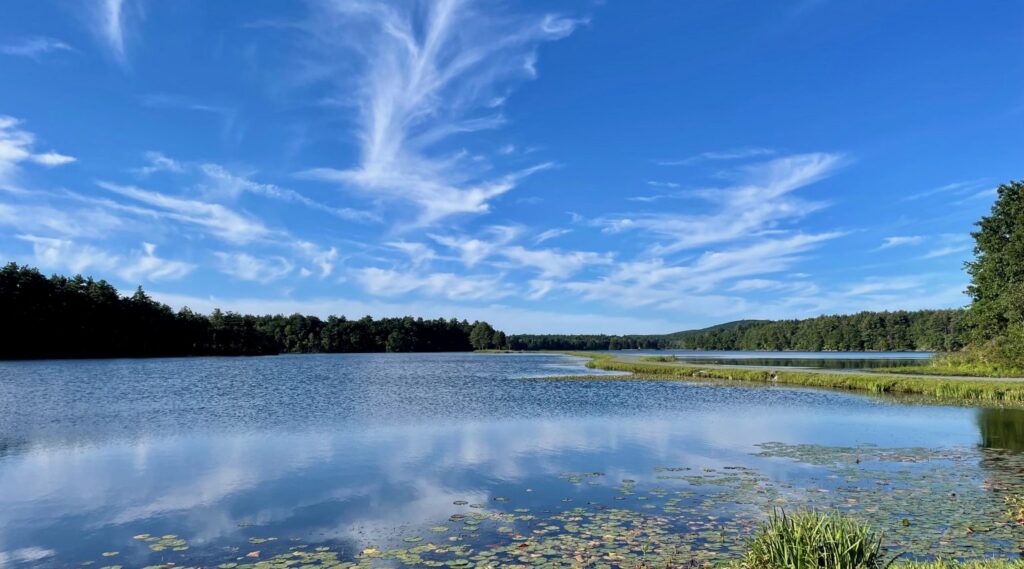Opinion: What Climate Doomers Get Wrong

Ashley Pond, Holyoke, Massachusetts. Photo: Mary Renda.

Before I mention anything else, I want to acknowledge the horrors of the war in Israel and Gaza. I believe that every human life is precious. I’m deeply grieved by what is happening there, as well as in other wars around the world. Regardless of your political views, I want to invite you to join me in seeking to keep our hearts open toward both Palestinians and Israeli Jews and the suffering and loss they are experiencing. Each of us can contribute to reaching for greater human unity– an essential part of humanity successfully addressing both warfare and climate change.
Turning to climate change, 10 years ago climate denial was still common and a major obstacle to widespread public engagement with the issue. Outright climate denial is now relatively rare. I would say that climate discouragement is a bigger obstacle today. I’ve run into quite a few folks who admit that they are too discouraged to get involved in climate action. It’s natural for any of us to feel discouraged at times, but to let your discouragement keep you from engaging in climate action is to be part of the problem, rather than part of the solution.
Half of Young People Surveyed Say Humanity Is Doomed
Some folks believe that it’s simply too late and we are all doomed. A survey of 10,000 young people from 10 different countries found that more than half of them said that humanity is doomed. So when I encountered an interview with distinguished climate scientist Michael Mann with “what ‘doomers’ get wrong” in the title, I was eager for his answer.
The Science Doesn’t Support This View
He describes doomism as the view that we lack agency– that “It’s too late to prevent catastrophic, runaway warming and the extinction of all life.” He says, “There are a lot of people who think the science supports this view, but it doesn’t.”
Agency and Urgency
He insists that we can and must have both agency and urgency. “The impacts of climate change, no doubt, constitute an existential threat if we fail to act,” Mann concludes.” But we can act. Our fragile moment can still be preserved.”
He tackles two phenomena often cited by those who think we are doomed–the melting of the Greenland glacier and the permafrost melting and releasing huge amounts of methane. Mann’s area of expertise is paleoclimatology–studying climate change over billions of years. Looking at the historical record leads him to conclude that we still have a decent shot at preserving the Greenland ice sheet if we move promptly to reduce CO2 emissions.
Doomism as a Tactic of the Polluters to Discourage Activists
Mann points out that climate doomism has been adopted as a tactic of the fossil fuel polluters. If they can convince us that it’s too late to do anything, then the way is cleared for them to continue their climate-destroying, profit-making businesses. He notes that some climate doomers are weaponizing climate history and pushing the idea that past mass extinctions were driven by runaway methane-driven warming. However, he finds that the science doesn’t support that view.
How Bad Is it? It Is Bad.
So, if it’s not time to embrace climate doom, how bad is the situation we are in? It is bad. Mann says “1.5°C [degrees of global warming] is already really bad, but 3°C is potentially civilization-ending bad.” In between we are rolling the dice. The big danger is not runaway climate change; it’s continued emissions of CO2. Current global climate policies and actions, if continued, would lead to warming of about 2.75°C, so more action is needed.
In Mann’s view, the polluters are seeking to use doomism to move climate activists and potential climate activists “from the frontlines to the sidelines.” So in the interest of discouraging doomism, I want to offer a few other good reasons to think a better outcome is still possible.
More Signs That a Better Outcome is Possible
New scientific work has established that if we can stop adding greenhouse gases to the atmosphere, the temperature will stop going up almost immediately and within 25 – 30 years will start to fall. Deforestation has peaked and is slowly declining.
The International Energy Agency just announced that although “the pathway to 1.5°C has narrowed in the past two years,” an unprecedented surge in clean energy production is keeping that window open. The world, with China leading the way, is now installing more than a gigawatt of new solar every day–the equivalent of new nuclear power plant every day.
This is still not fast enough. We still must enact laws and regulations to keep fossil fuels in the ground and dramatically reduce continued extraction by the reckless fossil fuel companies and the banks that finance them. But some things are moving faster in a good direction than anyone expected.
Fresh Wind in Our Sails
These new bits of good news can put fresh wind in our sails, and inspire each of us to find new ways to contribute to humanity’s shared effort to preserve a livable climate for all peoples.
Russ Vernon-Jones was principal of Fort River School 1990-2008 and is currently a member of the Steering Committee of Climate Action Now-Western Massachusetts. He blogs regularly on climate justice at www.russvernonjones.org.
